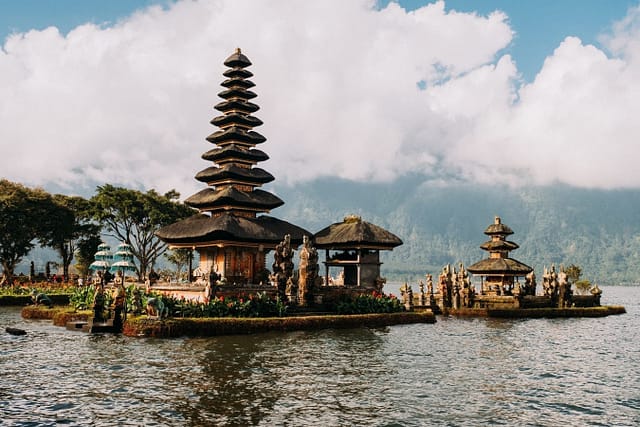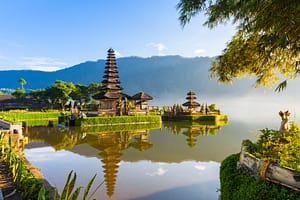From action and adventure to bohemian beach clubs, the Island of the Gods has plenty to offer travellers, but, beyond the tourist attractions, it’s Bali’s generosity of spirit and the kindness of its people that often leaves the greatest impression.
In this idyllic destination, traditions run deep. Even in the tourist centres where mini-buses and mopeds mass, side mirrors and sidewalks are adorned with offerings to the gods. Incredibly, Bali’s religious culture has remained steadfastly intact for thousands of years despite a Dutch invasion in the early 1900s, followed closely by an insidious influx of tourists in the twenty-first century.
Ask the locals or a guide to explain some of the traditions – you might be surprised at the daily rituals that can pass unnoticed. Balinese men, for instance, wear cloth hats on their heads with a peak that points up to connect them to God. Their sarongs also have a folded peak, which points down to connect them with Mother Earth.

The deep spirituality of the Balinese people permeates every aspect of their lives, but it is their generosity in sharing their culture that makes the island a special place to visit.
Canangs

When in Bali, you only need to take a few steps before you come across Canang Sari – the symbol of thankfulness to the Hindu god, Ida Sang Hyang Widhi Wasa, the supreme god of Indonesian Hinduism.
These daily offerings, given as thanks for peace on earth, consist of a small square woven basket filled with flowers, rice and a smouldering stick of incense, which are placed at the entrance to homes and temples, in front of and on statues, and even at the corners of intersections to ward off road accidents.
All traditional Balinese women learn how to make Canang Sari from an early age. It is considered one of their important daily duties. Creating these beautifully crafted offerings is a routine act of gratitude, which encapsulates the uniqueness of the Balinese people.
It’s easy to trip over the offerings, but be careful not to step on one. If the incense is burning it signifies that gifts to the gods are on their way to heaven.
Penjor and Gegoban
If one of Bali’s many ceremonies or festivals is in progress, the offerings become more elaborate. Intricate towers of flowers and fruit called gebogan are crafted and delivered to temples by being carried on the head. To Balinese people, the gebogan is also a symbol of how to reach their goals, whether said aspirations are related to their careers, finances or education. The tower is symbolic of how, in life, we should build from the bottom with persistence, patience and hard work until we reach our goal at the top.
During festivals, tapered ornamental bamboo poles, known as penjor, can also be seen perched outside the entrance to homes and local businesses. Another bamboo cage-like structure is attached halfway down the pole, called Sanggah Cucuk, which is used to place offerings in. A decorative fan made with coconut or palm leaves and flowers, called a sampian, hangs at the end of each penjor.
Pia Legong
The act of giving in Bali is not only reserved for the gods. The Balinese people are also very generous to their visiting family members and friends. This can be seen in another tradition: the giving of pia legong.
Pia are small pastry cakes filled with various types of fillings. They can be found all around Indonesia, especially in Java. But pia legong is different to other pia in Indonesia, because it can only be found in Bali.
Bali’s only pia legong store, The Kitchen House of Pia Legong, is conveniently positioned on the way to the airport. It’s always full and there is almost always a long queue out the door. Its offerings are so popular that each person is only permitted to buy two boxes per day.
Wyndham Dreamland Resort Bali
Experience the magic of Indonesia’s premier holiday destination with Wyndham Dreamland Resort Bali. Overlooking an award-winning golf course, just steps from the famous Dreamland Beach, this luxurious resort is perfect for relaxation, family holidays and surf trips, with facilities including a spa and wellness centre, two swimming pools, multiple dining options, a yoga studio, kids’ club, function spaces and a wedding chapel. Nestled in nature, the resort is also positioned close to several key attractions.

Attractions Near Dreamland
El Kabron
Perched high on the limestone cliffs of the Bukit Peninsula is one of Bali’s best-kept secrets. Hidden from view down a quiet country lane you’ll find a Spanish-inspired villa called El Kabron (The Goat). One of Bali’s most exclusive adults-only beach clubs, this Ibiza-style, all-white villa contrasts beautifully against the azure ocean. Here the agenda is drink, eat, swim, repeat, with views to die for and a menu and soundtrack to match. A fine dining restaurant serves classic Spanish fare, or you can stick with the more casual tapas menu. Ensure you ring ahead to reserve your place.
Uluwatu Temple, Monkey Forest and Kecac Dance
One of six key temples believed to be Bali’s spiritual pillars, Uluwatu Temple (Pura Luhur Uluwatu) is renowned for its magnificent location and sunsets. Perched on top of a steep cliff approximately 70 metres above sea level, the temple also has a monkey forest inhabited by a band of long-tailed grey macaques at the entrance. They are very entertaining, but resist the urge to pat them. Remove sunglasses and any loose items, as they are quite mischievous and will help themselves to your belongings. For a true cultural experience, the Kecak Dance held at the temple is a stunning display where performers use human vocals in place of gamelan instruments to accompany the dance.
Garuda Wisnu Kencana Cultural Park

Known as GWK, the Garuda Wisnu Kencana Cultural Park is a major landmark project in the hills of Jimbaran, which features a large statue of Garuda – a mythological bird-like creature – in the Hindu god Vishnu’s hands. Once completed, it will be one of the world’s tallest statues, with magnificent panoramic views of Bali. This expansive park features Hindu monuments, cultural performances, shopping and dining. There are also Segways available for rental so you can cruise around the vast site.







